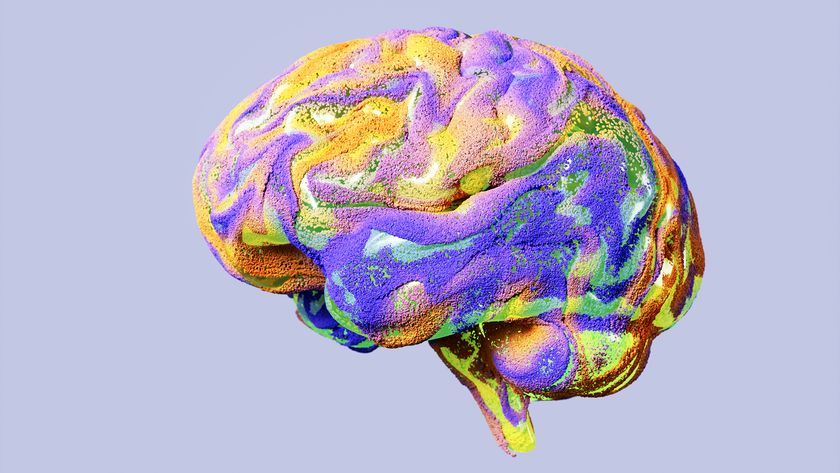To Resist Temptation, Put It Off

SAN DIEGO - If a forbidden doughnut is tempting you to break your diet, tell yourself you'll have a bite later — just don't specify when.
That strategy makes it less likely you'll go on a doughnut-eating spree, according to new research presented here last week at the annual meeting of the Society for Personality and Social Psychology. Unlike simply delaying gratification ("I'll wait until dessert"), promising yourself a temptation at a nebulous later date can actually decrease the amount of your ultimate consumption of that temptation.
"It really keeps the temptation at arm's length," said study researcher Nicole Mead, a psychologist at the Catolica-Lisbon School of Business and Economics in Portugal.
In a series of experiments, Mead and her colleagues found that this postponement strategy neither encourages guilt-ridden indulgence in an unhealthy treat nor does it encourage painful abstinence (which all too often leads to later bingeing). In one experiment, the researchers provided volunteers, who were completing various tasks in the lab, with bowls of M&Ms. Some students were told to eat the M&Ms if they wanted, some were told to avoid eating them, and a third group was told that they could eat the M&Ms later, if they felt like it.
At the end of the experiment, after the students could assume the researchers were no longer interested in them, the psychologists brought back the M&M bowls. The students who had snacked on the treats to their satisfaction earlier ate 5.19 grams of the candies (in addition to what they'd eaten already). Those who were deprived of M&Ms earlier went wild, eating 9.81 grams. In comparison, the postponement group ate 5.08 grams, the least of all three groups.
"Participants in the 'don't eat' condition ate practically double the amount of M&Ms" as those in the "wait until later" condition, Mead wrote in an email to LiveScience.
Not only that, she said, but the experiment had real-world implications right away. Participants who had been forbidden from eating chocolate at first in the experiment ate chocolate on average 4.48 times in the week following the experiment, and participants who had been able to eat M&Ms at will ate chocolate 3.18 times on average in the next week. But participants in the "wait until later" condition ate chocolate only 1.15 times, on average, over the next week.
Sign up for the Live Science daily newsletter now
Get the world’s most fascinating discoveries delivered straight to your inbox.
"What this means is that postponement has real implications for everyday consumption," Mead said. "It encourages self-control."
In another experiment, the researchers extended the findings to the real world, giving potato chips to 105 students at a Netherlands high school. The students were divided into the same groups as in the M&M study. And this time, an additional group of students could choose between the three eating plans.
The researchers then tracked how many chips the students ate over the next seven days. Just as in the lab, students who put off eating the chips until later ended up eating the least, and didn't compensate by overeating other snack foods, Mead said. Best of all, the strategy worked whether chosen or assigned. [7 Diet Tricks That Really Work]
"It's a cooling-off strategy," Mead said.
Most likely, postponing a treat until an unspecified later time helps get people over the hump of strong temptation, said Florida State University psychologist Roy Baumeister, who studies willpower but was not involved in Mead's research.
"You need the resistance at the moment of peak desire, then the peak desire moment passes," Baumeister said.
It's not clear whether using the postponement strategy would work as a weight-loss method, Mead said, as focusing on the dieting aspect of postponement might, ironically, keep the temptation in your mind, where you have to fight it. (Research published in the journal Science in 2010, however, showed that fantasizing about a particular food could actually help you resist eating that food.)
But passing on the desired treat once might even revamp a person's self-image, Mead said. A person who turns down M&Ms in the moment might start to think of themselves as someone who doesn't even like M&Ms all that much. The next time the opportunity comes around, it may be easier to turn down the chocolates again.
"It seems that every time they encounter it again, they desire it less and less," she said.
The trick, Mead warned, is not to promise yourself the treat at a specific time. In one lab study with cookies as a temptation, the participants who had to put off eating the cookies until the end of the study ate just as much as those who got to give into temptation earlier.
"If you make it specific, then you're probably going to engage in that consumption," Mead said.
You can follow LiveScience senior writer Stephanie Pappas on Twitter @sipappas. Follow LiveScience for the latest in science news and discoveries on Twitter @livescience and on Facebook.

Stephanie Pappas is a contributing writer for Live Science, covering topics ranging from geoscience to archaeology to the human brain and behavior. She was previously a senior writer for Live Science but is now a freelancer based in Denver, Colorado, and regularly contributes to Scientific American and The Monitor, the monthly magazine of the American Psychological Association. Stephanie received a bachelor's degree in psychology from the University of South Carolina and a graduate certificate in science communication from the University of California, Santa Cruz.











